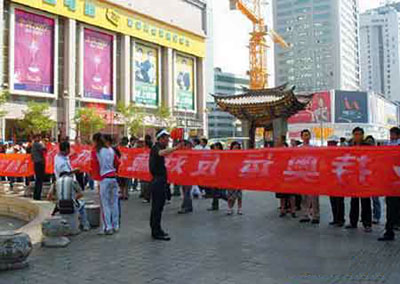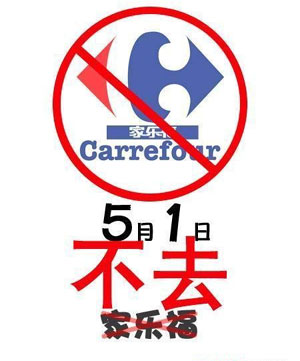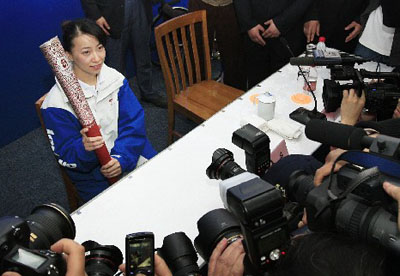Carrefour said they would reserve the rights to initiate legal actions against any individuals and organizations that spread "unfounded" and "malicious" rumors against it.
Witnesses told China.org.cn that at least in Kunming and Beijing these last two days, consumers were noticeably fewer than usual.
|

Some 30 demonstrators protest before the Carrefour in city of Kunming, Yunnan Province, April 15, 2008.
|
One student surnamed Wu in Kunming said that the boycott was not meant to cause trouble, but rather to send a clear message to the outside world: "If anyone dares to challenge our sovereignty and dignity, they will witness our Chinese united power to fight back! We must stand up this time. 'Love our motherland' will no longer be simply empty words."
When asked about the French goods boycott, Foreign Ministry spokeswoman Jiang Yu told the French side to think about and reflect upon all the Chinese people's opinions and feelings that had been expressed recently. "All these actions are by no means accidental," she said, believing "these people will abide by laws and regulations in expressing their reasonable appeals."
Whether to boycott French goods or not is being hotly debated among the Chinese public these days. Bai Yansong, a famed Chinese TV host and a torchbearer expected to hold the flame in Sanya, Hainan Province, wrote in his blog, stating that he will stay away from the boycotts.
|

One logo for the Carrefour boycott campaign is circulating on the Internet.
|
"Many may not go to the supermarket that day (May 1), but I'm sure many also will go. We should not punish ourselves for others' mistakes," he said, adding that most staff members in Carrefour China are Chinese, and goods sold in Carrefour are almost all made in China. "It's like an internal conflict."
Bai represents one of the vast numbers of people who would "love the country rationally" without enlarging the negative impact between Chinese and French people. They believe China should be wise, generous and tolerant to some anti-China actions because China should start to adopt a superpower manner because it has already holds an unshakable position inside the international community.
"What's the difference between 'boycott French goods' and 'boycott the Olympics?'" some folks wonder, asking if China should seal itself off from the world again by boycotting a certain number of foreign nations' goods. Also, pro-Tibet activists exist in every Western country.
|

Jin Jing comes back to her hometown Shanghai, April 13, 2008.
|
Even Jin Jing, now a national heroine for protecting the torch from activists in Paris, has said "no" to boycotts. "People should be careful when they hear calls for boycotts," she said. "We will hurt ourselves."
Several boycott calls have happened before: when Chinese and American jets clashed in 2001 and when the Japanese wanted to join the UN's Security Council in 2005. But all of these incidents caused little impact on either side because globalization represents the merging of international manufacturing and sales.
CNN the sophisticate
Atlanta-based American cable TV CNN once again threw out a sophisticated response after the Chinese people, some American-Chinese, and even the Chinese government, accused it of racist and vicious attacks on Chinese in a TV program called "Situation Room" that aired on April 9.